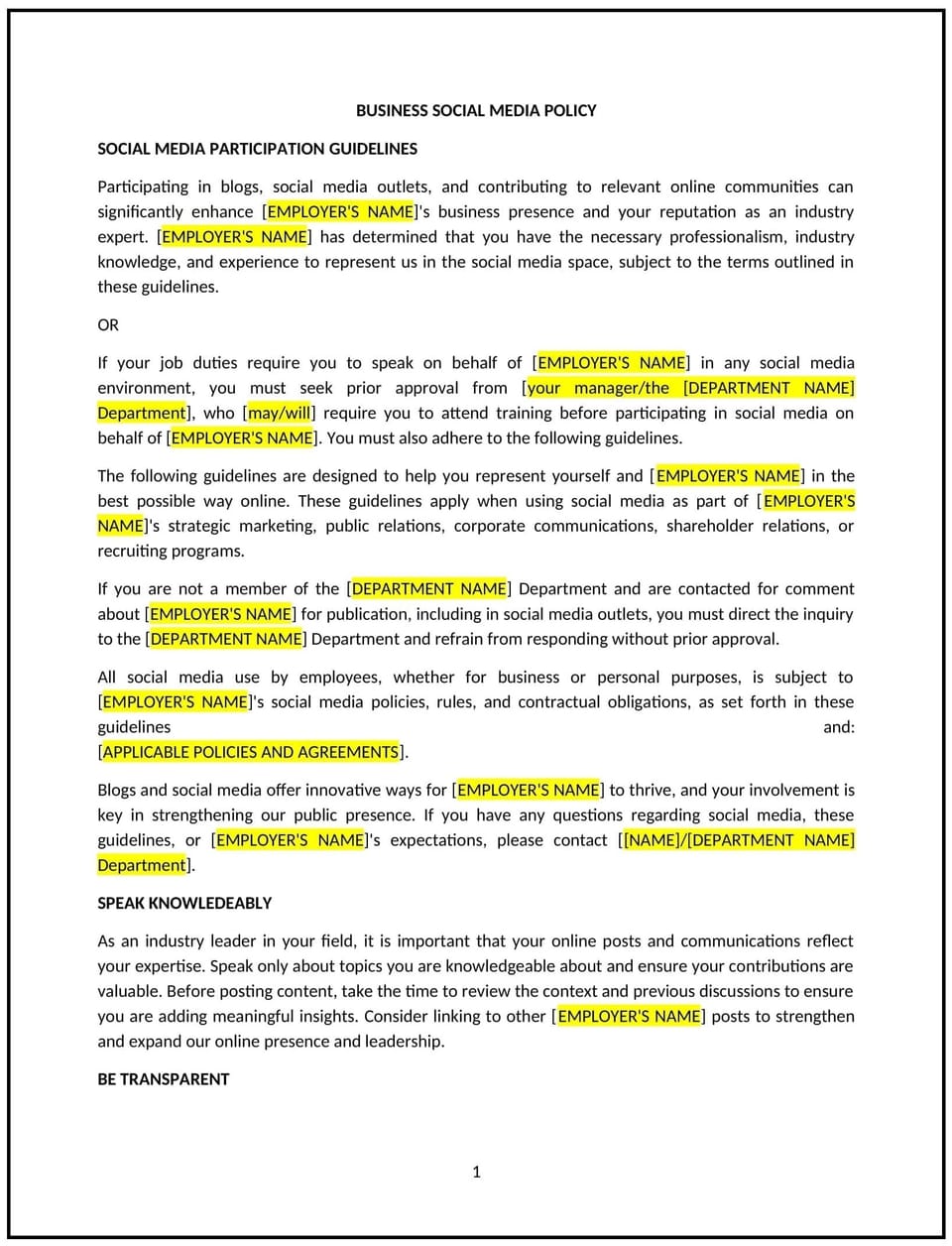Business social media policy (Iowa): Free template

Business social media policy (Iowa)
A business social media policy helps Iowa businesses establish guidelines for employees using social media in a professional or personal capacity when discussing work-related matters. With social media playing a significant role in branding, marketing, and customer engagement, businesses need clear expectations to protect their reputation while allowing employees to communicate effectively online.
This policy outlines best practices for social media use, including professional conduct, confidentiality, and brand representation. It provides businesses with a structured approach to balancing transparency and professionalism in online interactions.
By implementing this policy, businesses in Iowa can safeguard their brand, encourage responsible online behavior, and reduce risks associated with social media misuse.
How to use this business social media policy (Iowa)
- Define acceptable social media use: Establish guidelines on how employees should engage with work-related content on social media.
- Differentiate personal and professional accounts: Clarify expectations for employees using personal accounts versus company-managed profiles.
- Set brand representation rules: Ensure that only authorized employees speak on behalf of the business on official social media channels.
- Protect confidential information: Prohibit the sharing of proprietary, financial, or client-related information on public platforms.
- Address respectful communication: Encourage professionalism and discourage offensive, misleading, or inappropriate posts related to the workplace.
- Establish response guidelines: Outline how employees should handle social media interactions, including customer inquiries or public complaints.
- Provide training on social media risks: Educate employees about privacy concerns, misinformation, and best practices for online engagement.
- Review and update: Regularly assess the policy to reflect changes in social media trends and business needs.
Benefits of using this business social media policy (Iowa)
This policy offers several advantages for Iowa businesses:
- Protects business reputation: Establishes guidelines for professional and responsible online engagement.
- Reduces legal and security risks: Helps prevent the unauthorized disclosure of confidential or sensitive information.
- Enhances brand consistency: Ensures a uniform voice and message across all company-related social media activity.
- Supports employee awareness: Educates employees on the impact of their social media presence on the business.
- Encourages responsible online conduct: Promotes ethical and respectful interactions on digital platforms.
- Minimizes workplace conflicts: Reduces the risk of social media-related disputes among employees.
Tips for using this business social media policy (Iowa)
- Train employees on best practices: Businesses should provide training on professional social media use and security risks.
- Establish clear content guidelines: Businesses should outline what employees can and cannot post about the company online.
- Limit who speaks for the company: Businesses should designate official social media representatives to manage corporate accounts.
- Monitor brand mentions: Businesses should track online discussions related to the company to address concerns proactively.
- Protect employee privacy: Businesses should respect personal social media use while setting expectations for work-related discussions.
- Update guidelines regularly: Businesses should adjust social media policies as digital platforms and communication trends evolve.
Q: Why should Iowa businesses implement a social media policy?
A: Businesses should implement this policy to protect their reputation, ensure professional online engagement, and minimize security risks.
Q: Can businesses regulate employees’ personal social media use?
A: Businesses should establish guidelines on work-related discussions but should not restrict lawful personal social media activity outside of work.
Q: What should businesses do if an employee posts inappropriate content about the company?
A: Businesses should address the issue privately, review the policy with the employee, and determine appropriate action based on the circumstances.
Q: How can businesses ensure brand consistency on social media?
A: Businesses should provide employees with social media training and create approved messaging guidelines for official communications.
Q: Who should be responsible for managing the company’s social media accounts?
A: Businesses should designate specific employees or teams to manage and oversee official social media interactions.
Q: How should businesses handle customer complaints on social media?
A: Businesses should respond professionally, address concerns promptly, and direct complaints to the appropriate support channels.
Q: How often should businesses review their social media policy?
A: Businesses should review the policy annually to align with new social media trends, platform changes, and company goals.
Q: Should businesses monitor employee social media activity?
A: Businesses should focus on public content that directly affects the company while respecting employees’ privacy.
This article contains general legal information and does not contain legal advice. Cobrief is not a law firm or a substitute for an attorney or law firm. The law is complex and changes often. For legal advice, please ask a lawyer.


